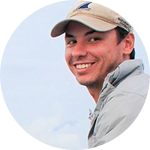About This Project
Saint Vincent has developed a shark fishery in recent years, but little is known about the commercially valuable species present or their conservation status in these waters. This project will gather important data on what shark species are present by working with fishers to record underwater video, assess shark diversity in local waters, and identify which sharks are being consumed. This data is a crucial step for improving knowledge of shark populations in the southern Caribbean.
Ask the Scientists
Join The DiscussionWhat is the context of this research?
Historically, shark meat has not been a preferred food item in the Caribbean, most catches coming from non-target bycatch. Recent data suggests a shift in local perceptions of sharks as food and their higher price per pound than other fish in local markets reflects these perceptions. Due to this market shift, shark fishing has become increasingly important to the locals of Saint Vincent in recent years and is becoming a reliable source of food/income through a subsistence fishery. While the catch and consumption of sharks has increased, our knowledge of the species in the area and which are being caught/consumed has not. This information is critical to sustainable management of this fishery.
What is the significance of this project?
Many sharks are less resilient to fishing pressure than other species due to life history traits such as low fecundity, late-age of maturity, and relatively slow growth rates. Due to this decreased resilience, there have been severe population declines across shark species, including up to an 85% decline in Atlantic coastal sharks. Saint Vincent presents a unique opportunity to work with local fishers to collect baseline data on the shark populations present and determine potential long-term impacts on these species.
What are the goals of the project?
We hope to collect information about what species are present in the waters surrounding Saint Vincent by deploying video recording devices. We will deploy the cameras twice each day we are in the country. This will amount to roughly 20 hours of video recording which will then be reviewed and shark species present will be identified and recorded. This will allow for an estimate of species diversity in the waters where sampling takes place. We will also identify what sharks are being sold in local markets to see if there are any species of conservation concern. These assessments will help inform local management of shark species in these waters.
Budget
This experiment.com project will help to cover the cost of travel from Miami International Airport to Argyle International Airport and housing for our team while they are in St. Vincent. It will also cover the cost of the cameras necessary to monitor the fish aggregating devices and obtain the recordings needed to assess species occurrence. Finally, these funds will cover the expenses for a local fisherman's time, boat, and fuel to be used in field operations while on the island.
Endorsed by
 Project Timeline
Project Timeline
The current goal is to be present in Saint Vincent by early Fall/Winter of 2022. We will spend two weeks in the country collecting data. Once our team has returned to the US, we will analyze the data by the end of Spring 2023. During this time, we will be closely analyzing the many hours video recordings obtained and accurately identifying the species seen in the recordings. Finally we will write and submit our findings in a scientific journal.
Oct 03, 2022
Project Launched
Dec 04, 2022
Travel to Saint Vincent
Dec 17, 2022
Data Collection Complete
Dec 18, 2022
Return to the US
Apr 30, 2023
Finish Analyzing Data
Meet the Team
Christopher Will
I am a third year MSc student at the University of Miami studying the physiological impacts of recreational fishing. I am also a research team member of Field School, an elasmobranch and tropical ecology research team based out of Miami, Florida. I received my B.S. in Biology with a concentration in Ecology and Evolution from James Madison University.
I began studying elasmobranchs as an intern with Field School in Miami, Florida and immediately fell in love with these animals. I am particularly interested in their physiology, especially the impacts of human induced stressors. After graduate school, I hope to continue working in shark science and doing field work.
Lab Notes
Nothing posted yet.
Additional Information
We will also be collecting samples from fish markets for use in studying mercury concentrations of local species. This analysis has been previously funded but will benefit from additional samples made possible by this experiment.com funding.
Project Backers
- 2Backers
- 1%Funded
- $50Total Donations
- $25.00Average Donation

